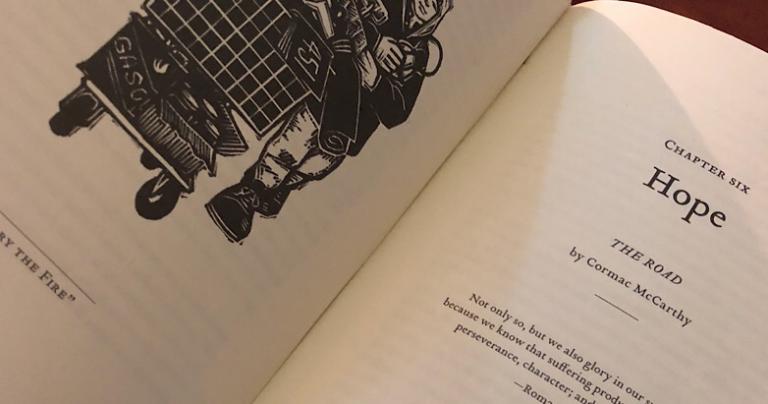 Gentlereader, I married Hope.
Gentlereader, I married Hope.
As a result, I end up writing about hope (the virtue) a great deal. This is not just for the purpose of Husband Humor (a genre of jokes no greater than Dad Humor), but because I particularly need hope.
Hope is the virtue that is God’s greatest gift to those who are depressed. Things are not better now, but someday. The promise of paradise is hopeful. If you are often sad, then you should have hope with you . . . Always.
Karen Swallow Prior (KSP) helps us go deeper with the theological virtue we need most in our time using The Road by Cormac McCarthy. If you have read the novel, and you should, then post-apocalyptic life with a grocery cart is not immediately hopeful. Of course, a good professor helps us see a book deeply. If novels are practice in virtue, then deeper readings are training for deeper virtues. The story of a father and son, unnamed in a text as undisciplined as the post-apocalyptic world in which they travel, is a hard road for hope, but hope is there.
The depths of the book get us to the depths of the virtue and this is good. For a Christian, after all, if it is the end of the world as we know, we can feel hopeful:
In revealing our present condition, traditional, religious apocalyptic literature directs our future hope.
This is not because Christians cannot see the goodness of this life or feel joy. We do, but we also have eternity in our hearts and know that (even if only in self) that what is is not what should be.
The gap between “is”and “should be” is our doom, the message of a Christian apocalypse is hope. What is good now will be saved and what is bad will be redeemed by Mercy.
Secular people also write apocalypse and hope is hard to come by:
Modern apocalyptic literature, which is largely secular apocalyptic literature, demonstrates the truth about the modern condition: because we have replaced God with ourselves as the source of meaning and the center of the universe, “all we see on the horizon is our end.”
KSP noted that the journey story is one of our most basic tales. Homer can return to Ithaca, Dorothy knows there is no place like home, and Bilbo will go there and back again, but for the characters in The Road there is no obvious end to the journey. The Road is a wasteland, home is gone, and the end of the road may just be an end:
Hope has been called “the virtue of the wayfarer,” and The Road is the simple, but harrowing, story of a father and son who are wayfarers in a postapocalyptic world bereft of nearly all life.
Where is hope? Is there hope in this novel? KSP finds hope in the very act of reading a difficult book. How?
What is hope?
KSP turns to Aquinas for hope’s characteristics:
The four conditions of hope are that it regards something good in the future that is difficult but possible to obtain. The practice of hope, Aquinas says, is “a certain stretching out of the appetite towards good.”
Hope is not fantasy. This is a mistake that simple-minded movies often make: a dream may be a wish the heart makes, but that is not hopeful and means at least one’s intellect is fast asleep. Many dreams our hearts make are impossible, would not be good if we had them, or are incompatible with other, better things we desire.
The phantasm, the wistful wish, is not hope, because hope has the solidity of goodness and a road to make the hope reality. KSP:
To wish is not to hope. A wish is not a virtue. Hope is.
KSP rightly argues that many animals, including the human animal, can know a kind of hope. I am hungry just now and know lunch has been ordered. I hope it will be tasty. Our cat Athena has this same hope when she hears the can of food being opened. This is a good gift, this hope, but it is not a theological virtue.
There is a gift of God that hopes for the Good Himself. As KSP demonstrates, this hope is neither presumption nor despair, because God’s good gift of hope is real. Presumption and despair both assume what is false about reality. We cannot hope if we do not know how things are and part of that reality is that the way of hope is hard, yet also (by God’s grace) achievable.
We can get home. There is a home. Know hope, even though we are broken.
God can give hope to anyone.
The story The Road may intend secularity, never mentioning God or religion. Yet people created in God’s image cannot resist reality. God has a common grace for all His children.
The Father loves his sons and daughters and so despite the wasteland we have made, journeys with us. He does not do so lightly, but through the Incarnation takes on our pain. The God who will feel forsaken, a Divine Son alienated from the Good Father, is a ground for eternal hope. God will not forsake us and understands the depths of pain and despair.
KSP is just right to see the love of the father in The Road as being a hope against appearance. The very world Cormac McCarthy creates is so real that the hopelessness he intends cannot be sustained. Hope keeps coming back, because the author has created an apolcypse more real than he may have intended!
(This happens often enough, reality pushing against genius, that one should never limit the meaning of a great book to authorial intent.)
On Carrying the Fire
KSP notes the father divides the world between the “good guys” and “bad guys.” The good guys are “carrying the fire.”
The fire they are carrying is what makes them good guys. It entails hope.
“This is what the good guys do,” the father tells the boy. “They keep trying. They don’t give up.”
Hope is “a desire for something good in the future,” as well as “the thing in the future that we desire” and “the basis or reason for thinking that our desire may indeed be fulfilled.” Because hope is oriented toward the future, it is, in a certain way, “the basis of morality,” since moral choices incur future consequences. The direness of the pair’s situation transforms decisions that would be otherwise ordinary or inconsequential into profoundly moral ones, beginning with the decision to embark on the road.
“Carrying the fire” reminds us of Prometheus, the titan who stole fire from the gods to give to the creatures he has made: mankind. This act is sometimes used today as an image of secular humanism: man defying God. Yet in the deeper meaning of the old story, Prometheus is no human, but our creator. Against Zeus, the more powerful being, he loves his creatures and takes on our punishment to give us a good gift.
The gods and titans are not God. God looms behind the myths of Homer and Hesiod, dimly seen as Fate or some greater Zeus than the one who lives on Olympia. There can only be one God, since omnipotence cannot be shared. For the ancients, we are given the fire and we use the fire for mixed purposes. Our creator cares for us, but our creator cannot save himself, let alone others. Yet there is hope as the son of the god Zeus and woman, Heracles, will free Prometheus and undergo Theosis: becoming a god himself.
There is much dimly seen here and this deep myth, I would suggest permeates McCarthy. The tale of fire can be twisted to secular ends, but keeps returning to the Divine. Even the pre-Socratic philospher Heraclitus saw the gift of fire, essential to men becoming more than brutes, was somehow basic and tied to a divine Logos.
God came in the person of Jesus Christ and brought the true Light. On Pentecost the holy fire came as a good gift to women and men in the upper room creating a new civilization.
This is reality, the reality prefigured in the story of Prometheus and (I would suggest) echoed in Cormac McCarthy. The Christian story, once heard, is hard to escape utterly, because it is deeply real.
Hope on The Road
KSP emphasizes for us that “Hope is not the same as oblivion or naïveté” The Road keeps returning to hope and this hope is reasonable.
KSP points out that as a result of journey born of love and continued in hope, the man shows humility and magnanimity. The road may be awful, but such a journey makes the man great and good.
Pursuing the great good allows—or perhaps requires—appreciation of the other goods along the way. Both magnanimity and humility assist this. For even in a postapocalyptic world, goodness can be found.
As KSP suggests, the sheer goodness of deep reality cannot be hidden even in an apocalyptic landscape. This good pursued transforms us and since we are not just eternal souls, but also animals, we become part of the landscape.
The man transformed into a good man, a fine father, makes the nightmare world better. Where is the Good? The love of the father for his son is good. The good man at the end of the journey is good. There is beauty growing in the wasteland.
What KSP calls “merely human hope” in The Road is (as she suggests) connected to virtue of hope. I would go further and suggest that human hope is an icon of divine hope and so is a sign. If one hopes enough or even considers human hope, there is chance by God’s good grace that they will know the greater hope.
Of course, KSP is right to see the limits and the promise of secular apocalyptic literature:
Modern secular apocalypses—those that reveal a telos, or end, apart from the transcendent meaning and purpose—express even so a yearning “for Revelation—to make the deep pain and difficulties of our lives meaningful and finished.” In the absence of a “Thou,” the best a secular apocalypse can offer is a “thou.”
At end of this chapter on growing the virtue of hope, KSP points us to the “myth of progress.” This whiggish notion never quite dies in America. We keep hoping that somehow we are getting better every day and then measure better in stuff. The stuff may be filling the ocean, but the myth of progress cannot see the downside to the Ascent of Man.
The transcendent is lost with the garbage.
Yet even suffering for all that is the result of the fall, brings back our longing for trancendents. Our new phone cannot save us from pain and death. Hope does not save us from reality, but shows us the transcendent reality that gives pain and death purpose.
Even in so bleak, and ostensibly secular a novel as The Road hope grows:
Somebody like that does see the boy. After the father’s death, a family who has been watching them comes to the boy’s aid. They are a father, a mother, and two children. When the boy asks if they are “the good guys,” they assure him they are. And they are. They take him in. And sometimes the woman—the mother—talks to the boy about God.
Buy the book.
————————————-
This will be a twelve part series: Introduction, Prudence, Temperance, Justice, Courage, Faith, Hope,












